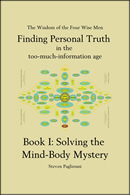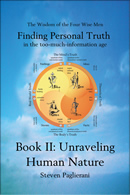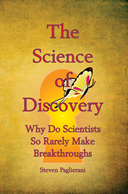
.png)
Excerpts from Unraveling Human Nature (how well do you know yourself?
When I was writing this book, I had the dumbest expectations.I expected people to be able to read this book like they read the NY Daily News. After all, reading grade-level checkers told me it had been written at a fifth grade level. And more. They told me I hadn't used enough big words.
The truth only revealed itself as I began my latest book. In it, I begin by asking readers to do a thought experiment. It's too long to repeat here. But the gist is, we humans are programmed to be unable retain these patterns. Even here though, what I'm saying will sound too outlandish to be true.
Fortunately, none of this matters if you can get even the simplest sense of things like Character Type. The passage I've included here describes the Character Type I call, "Ones." These are the folks the world currently blames for all manner of personal hells. Turns out the truth is these folks function more like one year old babies in grown-up bodies.
No problem so far, right? But now consider what this means. It means when those dreaded "narcisists" are beating on you, it's actually closer to what it's like when one year olds keep you up all night. One year olds don't give a damn how they affect you. They just want what they want. Character Type Ones are exactly the same.
I know. you've only read a few paragraphs and already I'm drowning you in ideas. The thing is, people who can manage to learn these ideas find it in them to love these folks. Truly. Not just pity. Genuine love. Imagine? If you can, then you're beginning to see why reading this book might change your life.
.png)
When Does Personality Begin?
Now we come to the pivotal moment in all of personality—the moment in which we’re forcibly and without warning ejected from paradise. To address this, we’ll need to face a question most theorists avoid—whether personality begins with conception, or whether it begins in the birth separation moment. This question—when does personality begin—is truly one of the more controversial and thought provoking. But to be a proper theory of personality, a theory must address this question.
So what do most theorists say?
Modern theorists, and most people in general, believe personality begins with conception. In Plato’s time though, many believed it began with the birth separation moment. Unfortunately, since none of us can—at least not with anything like scientific or spiritual certainty—remember what happened in the birth separation moment, we tend to avoid this question and defer to current assumptions. And since all these assumptions ignore the obvious—that the answer rests entirely on how you define personality—they leave us with no way to know for sure what they think makes you a person. Definitely a strange omission for theories purporting to be person-ality theories.
Strangely, novelists have done better. For instance, take Issac Asimov. In his 1976 novella, The Bicentennial Man, he poses this very question when he asks what would make a robot, a person. His point? That this quality is inordinately difficult to define. No kidding.
So when do we become persons? The wise men claim this occurs in the birth separation moment. Admittedly, it may take me most of this book to explain why they feel this way. At the same time, please know, this in no way implies we might have been nothing before this moment. Indeed, even a casual glance at the previous subsection shows their respect for this time in our lives. However, to call someone a “person” is different than to say he or she is alive, albeit, to see why, we’ll need to look at how being alive in the state of pre-personality (or before that, if your beliefs are so inclined) differs from being alive after the birth separation moment.
Whatever the truth here, to be a personality theory, this question—what makes us persons—must be addressed. So when does personality begin? Do you have a strong opinion? If so, do you have an equally strong supporting argument—a personal truth about this? Let’s see.
Character Type One: “Me” People
What is a character type One like?
Other than their acquired life skills, there is little difference between people with character type One and babies in their first year of life. Thus a One is a person who is either connected to someone or in a Me state—but with additional language skills, physical mastery, and a general sense of socialization.
Likewise, whenever Ones have a need, they act as if others exist solely to meet this need. And their enhanced life skills only improve their abilities to communicate these demands.
Conversely, when you’re connected to a One, it feels as wonderful as being connected to a baby. Thus Ones are often very charismatic people. Moreover, this dichotomy—between feeling totally connected and feeling totally unseen—is the hallmark of being around Ones. You either feel so connected to them that it’s like you’ve died and gone to heaven. Or you feel so totally invisible that it’s like you’ve fallen from grace into hell.
How does someone become a One?
The simple answer is, they finish baking in the first year of life. Here by “baking,” I’m referring to the stress they experience during their first year of life. In their case, the stress in their home is so high that it permanently programs them to focus solely on their own needs, while at the same time ignoring the needs of others.
This does not mean they cannot, at times, see and care about the needs of others. However, they can do this only after all their needs have been met. Moreover, even when they do perceive others have needs, rarely can they accurately see these needs, and this holds true even when other people clearly and distinctly state these needs.
Why does this happen? Because ones are simply incapable of putting themselves in another person’s place, at least when it comes to their needs. So when they sense that others have needs, at best, they perceive these needs as what they themselves might need. Even then, what they perceive is more an intellectual imitation of genuine care.
What happens when you do not accede to a One’s requests?
Very quickly, all hell breaks loose. They kick and scream—lie, holler and demand—and tell you you’re always being selfish. That they often tell this to the most generous, caring people of all matters not. When Ones have a need, all they live for is getting this need met. And they’ll torture and punish you until you meet this need. Or until you threaten to leave them and they realize you may actually follow through.
And after this need is met?
Amazingly, Ones feel no remorse for what they put you through. Again, no matter how mean, threatening, or punishing they’ve been—they are simply incapable of feeling bad for what they do to others. What they can feel, however, is regret for what they themselves have just been through. After all, according to them, if you’d only have listened to them in the first place, none of this pain would have been necessary. Indeed, if you’d just given them what they wanted, everyone would have been happy.
Does it sound like I am exaggerating their self-centeredness? I’m not at all. In fact, I, myself, have been on the butt end of this self-centered logic many times. For instance, I was once engaged to a One named Lisa who told me this very thing. She said she knew a couple wherein the woman’s fiancé did everything for her and that I should be more like this man. And when I asked her what he got from doing this, she told me—with a straight face—that he got her happy! Can you imagine? What he got for himself was that he got “her happy.”
Here then are two of the characteristics which define Ones. First, they believe that if they are happy, then everyone else will be happy. And second, while Ones can feel regret for how they have been affected by the struggle to get their needs met, they are incapable of feeling remorse for how they might have hurt others during this struggle. Here I’m defining regret as feeling bad about how what you’ve done has affected you—and remorse as feeling bad about how what you’ve done has affected others.
Are you finding this hard to believe—that these folks are incapable of feeling remorse for hurting others? Here again, this makes sense only if you can picture how babies behave in their first year of life, at least with regard to getting their needs met. Moreover, if you still find this hard to believe, then just think back to the last time you were in the presence of an inconsolable six month old. Holy cow! Talk about someone who cares only about their own needs—and doesn’t give two hoots as to how these demands affect others.
This, then, is how Ones react whenever they feel needy. Meet their needs quickly enough and they’ll beam at you. Fail to meet these needs and they’ll act like first year of life babies. Angry. Demanding. And relentless. So am I making it sound like being a One is a fate worse than death? To people other than Ones, it certainly can feel like this at times. Then again, Ones themselves don’t usually feel too bad about being Ones. Moreover, along with the obvious negative aspects, Ones can have many positive qualities.
If intellectually capable, Ones can make great leaders. Their ability to focus entirely on what they need people to do for them is largely unmatched by any other character type. Here their lack of insight as to the personal needs of others becomes an asset, especially in times wherein difficult decisions must be made, such as those which by their nature involve harming others—during wars or medical emergencies, for instance, or after natural disasters. No surprise then that many military leaders, doctors, policemen, politicians, and corporate executives are Ones, as well as most religious fanatics, mega-movie and sports superstars.
Ones can also be among the warmest, most complimentary, and charismatic people you’ll ever meet, at least in those times wherein they feel connected to you. In these moments, to them, you are the “one,” their soul mate and confidant. And time and again, they generously say this to you as you bask in the light of their infant-like adoration.
Finally, a good way to remember what a One is like is to recall that character type is first and foremost about just two things—determining who has needs, and determining who should meet these needs. Ones are incapable of personally experiencing anyone else’s needs, including the need to treat others with respect. Thus the key to understanding Ones is to realize that for them, witnessing someone else with needs can feel quite threatening. Worse yet, when Ones witness people expressing their needs, they often feel personally offended, as if these folks are being incredibly selfish and insensitive. To wit, in the presence of a needy person, Ones commonly switch the focus away from the needy person and onto themselves by saying things like, ”What about me!
Why does everything always have to focus on you?” And, “You’re always being so selfish! Can’t you see how this is affecting me!”
For example, during the time I was engaged to the Lisa I mentioned earlier, I once received a call that my then thirteen year old daughter had run away from the rehab she was in and needed to be picked up from the police station near this rehab. Being this was in the middle of my work day—and that she was three and a half hours away—I was understandably upset. However, when I called Lisa to tell her this and that I wouldn’t be home on time, she immediately got angry and yelled at me saying I should never call and upset her at work. Thus not only did she not offer me sympathy nor express any concern whatsoever. She yelled at me on top of this for upsetting her.
Lisa never did apologize for being this cold and callous. Nor did I ever try to get her to understand my hurt. Why not? Because back then, I had no idea the wise men existed let alone that I am a Two—a second year of life person. Meaning what exactly? Let’s look.
Books by Steven Paglierani



.png)